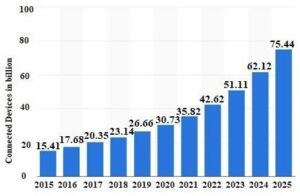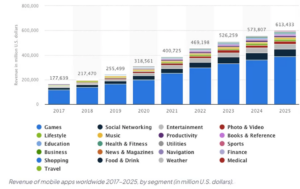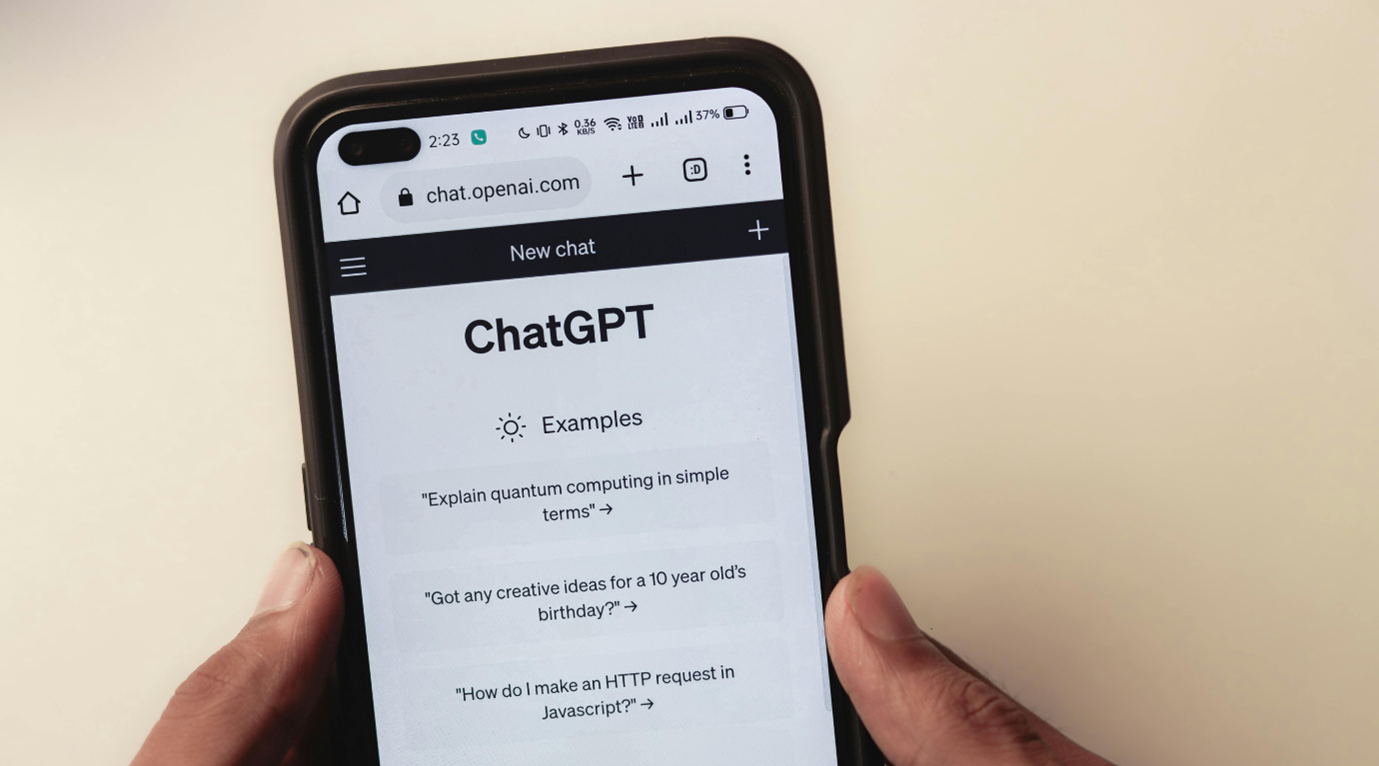The Most Influential Mobile App Development Trends in 2025
The global mobile app market is projected to grow from $573 billion in 2024 to $613 billion by 2025, reflecting a 6.98% annual growth rate.
However, this growth is accompanied by intensified competition, evolving security challenges, and changing user demands. Businesses must innovate and adapt to remain relevant. Here are the most impactful mobile app development trends shaping the industry:
1. AI-Driven Mobile Experiences
Artificial Intelligence (AI) and Machine Learning (ML) have evolved from simple automation tools to integral components of mobile applications, offering hyper-personalized experiences, intelligent automation, and predictive analytics.
- AI-powered recommendation engines enhance user engagement by offering personalized content and shopping suggestions.
- Voice-enabled AI assistants (like Siri and Alexa) are improving customer service and navigation.
- Predictive AI analytics helps businesses analyse user behaviour and pre-emptively address customer needs.
Example: AI-powered apps like Google Assistant, Netflix, and Amazon Alexa are reshaping voice search, content curation, and eCommerce recommendations.
2. The Expansion of IoT-Powered Mobile Apps
The Internet of Things (IoT) is revolutionizing industries by enabling real-time communication between smart devices and mobile applications. From connected homes to industrial automation, IoT-driven mobile apps are becoming essential.

- By 2025, there will be over 75 billion IoT-connected devices.
- Smart home automation apps, wearable health monitors, and logistics tracking solutions are driving IoT app adoption.
Example: IoT-powered apps like Nest, Fitbit, and Tesla’s mobile app are setting new benchmarks for remote control, automation, and real-time monitoring.
3. 5G-Enabled Mobile Applications
With ultra-low latency and 10x faster speeds, 5G is transforming mobile applications, unlocking new capabilities like seamless AR/VR experiences, high-definition streaming, and ultra-fast cloud computing.
- By 2025, over 40% of global mobile connections will be 5G-powered.
- 5G enhances mobile gaming, AI automation, and real-time healthcare applications.
Example: Apps like Apple Arcade, Google Stadia, and CloudXR are leveraging 5G for next-level gaming and immersive digital experiences.
4. Mobile App Security and Data Privacy Take Centre Stage
With the rise in cybersecurity threats and data breaches, businesses must prioritize robust security measures in mobile applications.
- End-to-end encryption protects sensitive user data.
- Zero-trust security models reduce the risk of unauthorized access.
- AI-driven fraud detection prevents identity theft and online fraud.
Example: Mobile payments apps like Google Pay, PayPal, and Apple Wallet are setting new standards in secure digital transactions.
5. The Growth of AR & VR Applications

Augmented Reality (AR) and Virtual Reality (VR) are transforming gaming, eCommerce, education, and healthcare by offering immersive user experiences.
- AR-based shopping experiences boost conversions by 40%.
- The global AR/VR market is projected to reach $52 billion by 2025.
Example: IKEA Place and Sephora Virtual Artist use AR to help users visualize furniture and makeup in real-time before purchasing.
Why Hybrid Mobile App Development is Gaining Traction
As businesses seek scalability, cost-efficiency, and cross-platform performance, hybrid mobile app development is emerging as a preferred choice over native apps.
What Are Hybrid Apps?
Hybrid apps combine web and native app elements, allowing developers to create a single codebase that runs across multiple platforms like iOS, Android, and the web. They are built using HTML, CSS, JavaScript, and frameworks like React Native, Flutter, and Ionic.
Advantages of Hybrid App Development
- Faster Time-to-Market: Businesses can launch apps 40% faster than native development.
- Cost-Efficient: Reduces development costs by 30-40%. (Albiorix)
- Unified Maintenance: Updates roll out simultaneously across all platforms.
Example: Apps like Instagram, Uber, and Twitter leverage hybrid frameworks for scalability and performance.
Build the Future of Mobile Apps Today!
Unlock scalable, secure, and high-performance mobile experiences with AI, hybrid frameworks, and next-gen technology.
Talk To Our Experts
The Numbers Behind the Trends
The rapid evolution of mobile applications isn’t just speculation—industry data confirms an explosive trajectory in mobile app adoption, revenue, and market influence. Understanding these statistics helps businesses strategize, anticipate market demands, and make data-driven investments in mobile technology.
1. Global Mobile App Revenue Growth (2024-2025)
The mobile app industry is seeing unprecedented revenue growth, driven by factors such as subscription-based models, in-app purchases, mobile commerce, and advertising revenue.
Key Statistics:
- In 2024, mobile app revenue stood at $573 billion.
- By 2025, this figure is expected to grow to $613 billion, marking a 6.98% annual growth rate.
- Gaming apps alone contribute nearly 60% of total app revenue, followed by lifestyle and entertainment apps.

Why This Matters:
- Businesses should prioritize revenue models such as subscription-based apps, freemium services, and ad monetization to capitalize on this growth.
- In-app purchases and AI-driven personalized ads are increasingly driving revenue, making AI-powered app development crucial.
2. Projected Mobile App Downloads (2024-2025)
The number of mobile app downloads worldwide continues to climb, reflecting growing smartphone penetration, digital dependency, and demand for mobile-first experiences.
Key Statistics:
- In 2024, the total number of mobile app downloads was 286.40 billion.
- By 2025, downloads are expected to hit 303.50 billion, marking an annual increase of over 6%.
- India, China, and the United States account for nearly 50% of global app downloads.
- The adoption of super apps (all-in-one platforms like WeChat and Grab) is further driving app engagement.
Why This Matters:
- Businesses should focus on mobile-first strategies, ensuring seamless app experiences across iOS and Android.
- Growth in downloads doesn’t always mean retention—companies should invest in user engagement, push notifications, and loyalty programs to keep users active.
The Road Ahead: Future-Proofing Mobile App Strategies
As technology evolves, businesses cannot afford to take a reactive approach. The key to sustained success lies in strategic investments in mobile innovation, AI-powered insights, security, and flexible app development frameworks.
1. Leverage AI-Driven Analytics for Smarter Decision-Making
AI is no longer a luxury—it’s a necessity for mobile app success. AI-driven user behaviour analysis, predictive recommendations, and personalized experiences can dramatically improve user engagement and retention.
How to Implement:
- Use machine learning algorithms to track and analyse user behaviour patterns, identifying which app features drive engagement.
- Deploy AI-powered chatbots for real-time customer support and automated interactions.
- Leverage predictive analytics to forecast demand, recommend personalized content, and optimize app performance.
Example: Spotify’s AI-driven recommendation engine helps users discover personalized playlists, keeping them engaged for longer.
2. Adopt Hybrid Mobile App Development to Reduce Costs and Scale Faster
Hybrid apps provide cost efficiency, faster deployment, and cross-platform functionality, making them an ideal choice for businesses seeking rapid growth.
Why Hybrid is the Future:
- Lower Costs: Businesses save 30-40% on development costs by building a single app for iOS and Android.
- Faster Time-to-Market: A unified codebase allows companies to launch apps quickly without building separate versions for each platform.
- Better Performance with Progressive Web Apps (PWAs): PWAs combine the best of web and mobile apps, offering offline functionality, push notifications, and smooth UX.
Example: Instagram and Uber use hybrid frameworks like React Native to ensure scalability, performance, and seamless cross-platform experience.
Actionable Takeaway: If your business needs a scalable, cost-effective mobile solution, hybrid app development should be a top consideration.
3. Prioritize Cybersecurity to Build Trust and Compliance
With rising cyber threats and data privacy regulations (like GDPR and CCPA), businesses must fortify mobile apps against security vulnerabilities.
Critical Security Measures for 2025:
- Zero-trust architecture: Verifies user identity at every access point, preventing unauthorized breaches.
- End-to-end encryption: Protects sensitive data from interception during transactions.
- Multi-factor authentication (MFA): Reduces the risk of credential theft and unauthorized logins.
- Biometric authentication: Face ID and fingerprint scans enhance security while improving user convenience.
Example: Apple Pay and Google Pay utilize biometric authentication and tokenized payments to ensure secure transactions.
Actionable Takeaway: Businesses must invest in AI-powered fraud detection, identity verification tools, and compliance measures to ensure user data protection.
4. Invest in Super Apps & Emerging Technologies
A new wave of innovation is emerging in the mobile app industry, with super apps and edge computing-powered apps leading the charge.
Key Trends to Watch:
- Super Apps: Integrated platforms like WeChat, Gojek, and Grab combine multiple services (payments, messaging, eCommerce) into a single app.
- Edge Computing for Low Latency: 5G-powered apps will process data at the device level, reducing cloud dependency and latency.
- Blockchain in Mobile Apps: Digital identity verification and secure in-app transactions are becoming more widespread.
Example: WeChat’s ecosystem combines payments, social networking, and business services into a seamless all-in-one experience.
Actionable Takeaway: Businesses should explore super app capabilities and edge computing to offer faster, more reliable mobile experiences.
Conclusion: A Future-Ready Mobile Strategy Starts Now
The mobile app industry’s evolution is unstoppable, and businesses must align with future-ready trends to thrive in this competitive landscape.
✔ AI-powered experiences, 5G optimization, and hybrid app development will define mobile success.
✔ Security and compliance will become key differentiators in user trust and brand reputation.
✔ Super apps and edge computing will drive the next frontier of mobile applications.
How Neuronimbus Can Help
At Neuronimbus, we partner with businesses to design, develop, and deploy future-ready mobile apps that leverage AI, hybrid frameworks, and secure architecture. Whether you need to optimize an existing app or build a new one from scratch, our expertise ensures your mobile strategy is scalable, innovative, and impact-driven.
Talk to our experts today to build the mobile app of the future.




